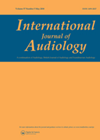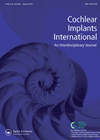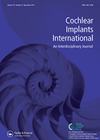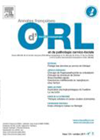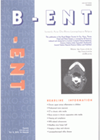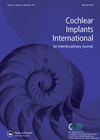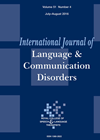
Journal Reviews
Cochlear implants and speech perception
Cochlear implants can be an effective treatment for specific hearing losses. They may often be the only way to restore hearing for profoundly deaf people. Therefore, it is very important to understand all processes that may influence effective fitting of...
Cochlear implantation in children with congenital long QT syndrome
Jervell and Lange-Neilsen syndrome is a condition where sensorineural deafness coincides with inherited abnormalities of the heart, resulting in prolonged ventricular repolarisation, frequently shown on an ECG with a prolonged QT interval. These children can present at implant centres for...
Inter-aural hearing preservation in cochlear implantation
Hearing preservation during cochlear implantation is becoming increasingly important, although results can be unpredictable. NICE are in the process of updating their guidance in the UK and it is possible that those with better hearing than the current candidates will...
Cognition outcomes after cochlear implantation – is there an improvement?
Older adults with a severe to profound hearing loss are more at risk of cognitive decline than adults of a similar age with milder losses or normal hearing. This poses challenges, not only in the assessment process, but also for...
Cochlear implantation in children with cognitive disabilities
Additional disabilities are frequently encountered in children born with hearing loss or deafness. A study from Denmark attempted to systematically review to what extent hearing-impaired children with cognitive disabilities benefit from cochlear implantation. The authors conducted an extensive search in...
CI and CP
Quality of life improvement is one of the main goals of cochlear implantation. Mobile phones are now a standard daily tool. For many implanted patients, a mobile phone is used for sending short messages rather than for voice calls. This...
Predicting speech recognition in adults with cochlear implants
This was a combined prospective and retrospective study from Belgium that looked at factors influencing speech recognition scores in quiet conditions (retrospectively) and speech reception threshold levels (SRT) in fixed noise conditions (prospectively) after cochlear implantation in postlingually deaf adults....
A new modified double-flap technique for cochlear implant surgery
The authors retrospectively assessed 342 implantees with a minimum of five years’ follow-up who had been implanted using a lazy S-shaped post auricular incision with a modified double-flap technique. From the notes, postoperative wound complications and any other adverse events...
Which factors affect music involvement in implanted children’s everyday life?
During the last few years, cochlear implantation research has included music. Processing strategies and rehabilitation teams are now interested in music appreciation by implantees, as speech perception and production are no longer the only issues or targets. The present study...
Does trainee participation in cochlear implant surgery affect operative times?
The role of surgical education is a very sensitive issue in spite of the obvious need and the obligation of doctors to pass on their knowledge and experience to the next generation. This study is very interesting as it assesses...
Supporting second language in bilingual children with cochlear implants
There have been mixed reports regarding the benefits of supporting two languages for bilingual children using cochlear implants. With an ever-increasing number of children with hearing loss undergoing cochlear implantation, this study provides timely clinical evidence. The authors studied the...
Can intraoperative electrically evoked auditory brainstem responses predict the outcome of cochlear implantation?
Electrophysiology during cochlear implant surgery remains an issue of debate among the various centres. In the present study, the latencies and quality of the eABR waveforms from 74 adult implanted patients were analysed. In addition, four children with severe cochlear...

